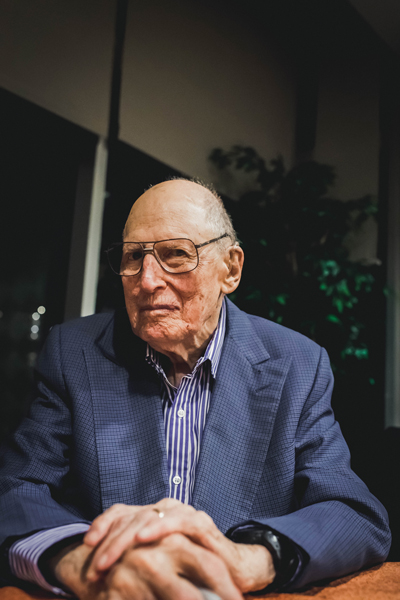 The fact that Henry Morgenthau III recently published his first book of poetry, A Sunday in Purgatory, would not be particularly noteworthy except for two facts: He comes from the eminent Morgenthau family, and he just celebrated his 100th birthday.
The fact that Henry Morgenthau III recently published his first book of poetry, A Sunday in Purgatory, would not be particularly noteworthy except for two facts: He comes from the eminent Morgenthau family, and he just celebrated his 100th birthday.
Though Morgenthau spent much of his professional life writing—producing documentaries for WGBH in Boston and the book Mostly Morgenthaus, about his famous family—he’d written very little about himself.
“Poetry presented an opportunity to share a lot of things that had been festering within me for many years,” he said, “and also something that was quite different from the contributions of some of the other distinguished members of my family.”
Distinguished, indeed. His father, Henry Morgenthau Jr., was Franklin D. Roosevelt’s secretary of the Treasury and a principal architect of the post-World War II plan for rebuilding Germany. His grandfather, Henry Morgenthau, was Woodrow Wilson’s ambassador to the Ottoman Empire during World War I and a leading voice opposing the Armenian genocide. His brother Robert was the longtime Manhattan district attorney on whom Law and Order’s Adam Schiff was modeled. Other famous relatives include the Lehman brothers, historian Barbara Tuchman, journalist Jane Mayer and former Seagrams and Warner Music Group CEOs Edgar Bronfman and Edgar Bronfman Jr.
But publisher Kendra Kopelke, of Baltimore-based Passager Books, said she and her co-publisher, Mary Azrael, knew nothing about Morgenthau’s background when they first read his poetry.
“We recognized immediately his strong sense of language,” said Kopelke, “[and] his ability to express in his poems things that we hadn’t read by someone at his stage of life.”
Morgenthau started writing poetry a few years ago, after he moved from Boston to the Ingleside Retirement Community in Washington, D.C., to be closer to his family.
Many of his poems, Morgenthau says, “have to do with my privileged life and my close brush with historic moments.” His poem “A Terrific Headache,” for example, is based on his father’s account of having dinner with FDR the night before the president died.
American University professor David Keplinger says Morgenthau’s poems are “incredibly funny and warmhearted—and tender, as well. There’s never that humor that goes too far over into the distance or that tenderness that goes too far over into the sentimental.”
“Writing poetry for me is a celebration of the evening of a long life, a coda, a strikingly new expression of my inner life, surprising to me and to those that know me,” Morgenthau reflects.
Morgenthau’s publisher Kendra Kopelke agrees: “Here’s a poet digging deep into his family and also psychic history, trying to expose a true self that’s been covered over for maybe 80 or 90 years.”
“They represent a final spurt of energy to express and expel thoughts,” Morgenthau said of his poems. “Why I waited so long, I don’t know.”
A Sunday in Purgatory is available from Passager Books: passager books.com
A SUNDAY IN PURGATORY
Henry Morgenthau III
A voluntary inmate immured
in a last resort for seniors,
there are constant reminders,
the reaper is lurking around that corner.
I am at home, very much at home,
here at Ingleside at Rock Creek.
Distant three miles from my caring daughter.
At Ingleside, a faith-based community
for vintage Presbyterians, I am an old Jew.
But that’s another story.
I’m not complaining with so much I want to do,
doing it at my pace, slowly.
Anticipation of death is like looking for a new job.
Then suddenly on a Sunday,
talking recklessly while eating brunch,
a gristly piece of meat lodges in my throat.
I struggle for breath, too annoyed to be scared.
Someone pounds my back to no avail.
Out of nowhere, an alert pint-sized waiter
performs the Heimlich maneuver.
I don’t believe it will work.
It does! Uncorked, I am freed.
Looking up I see the concerned visage and
reversed collar of a retired Navy chaplain,
pinch hitting as God’s messenger for the day.
Had he come to perform the last rites,
to ease my passage from this world to the hereafter?
Don’t jump to dark conclusions.
In World War II on active duty,
he learned the Heimlich as well as the himmlisch.
Knowing it is best administered
to a standing victim,
he rushed to intervene.
On this day I am twice blessed
with the kindness of strangers.




